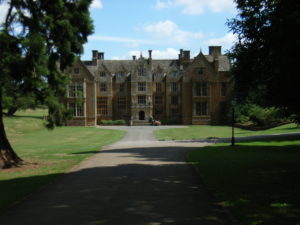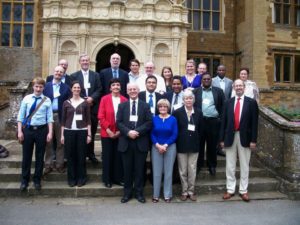
Wroxton College – Image Credit: J. Ketterer
Last weekend I attended the 9th Workshop of Parliamentary Scholars and Parliamentarians, held at Wroxton College in the UK. The workshop is organized by the Centre for Legislative Studies at the University of Hull and co-sponsored by the Inter-Parliamentary Union and the Research Committee of Legislative Specialists of the International Political Science Association.
The driving force behind the conference is the Director of the Centre for Legislative Studies, Philip Norton, who is known as Lord Norton of Louth in his role as a member of the British House of Lords. And that combination embodies why this bi-annual gathering is so important, as it draws a combination of legislators, legislative staff, legislative studies scholars and those involved in legislative strengthening programs. Many at the workshop fall into more than one category. Attendees came from a variety of countries, some with long legislative traditions and others whose legislatures have been grappling with reform initiatives for only last two decades. Topics discussed included oversight tools, constituency development funds, legislative public engagement, reform of upper houses, bicameral legislative processes, and many others.

Some Workshop Participants with Professor the Lord Norton of Louth (center) – Image Credit: J. Ketterer
The overall mix of papers highlighted yet again that many legislatures are still largely understudied, and that there is a particular dearth of comparative studies that include the developing world. Even less understood by scholars is the efficacy of legislative strengthening programs that have been carried out since the last 1980s. It is not that effectiveness has not been examined (the British Department for International Development commissioned a report in 2007, see here,and the Africa All Party Parliamentary Group produced an outstanding report on improving parliamentary assistance to Africa, see here). USAID, The World Bank Institute and others have also wrestled with finding ways to measure whether or not the many millions of dollars spent on legislative development is making any measurable and sustainable difference. To do so in a way that is both methodologically rigorous and relevant to policymakers continues to be a challenge. Much of the problem lies in answering the “so what?” question. Sure, after a three-year, multi-million dollar USAID project a parliament might have an electronic voting system, bill tracking computers and a new committee handbook – but does that mean the institution is more effective and democratic? And how does it contribute to the overall development of the political system in question? There are many variables at work in this equation and we know the real time-line (as shown in the US and UK is measured in many decades, not the life of a contractor’s three years of funding.
To be sure, there are scholars looking at these issues, but the gap between legislative studies and legislative strengthening remains wide. More conversations like those had at Wroxton are needed, in person and in writing.

Parliamentary Development in Ukraine – Image Credit: Moscow Times